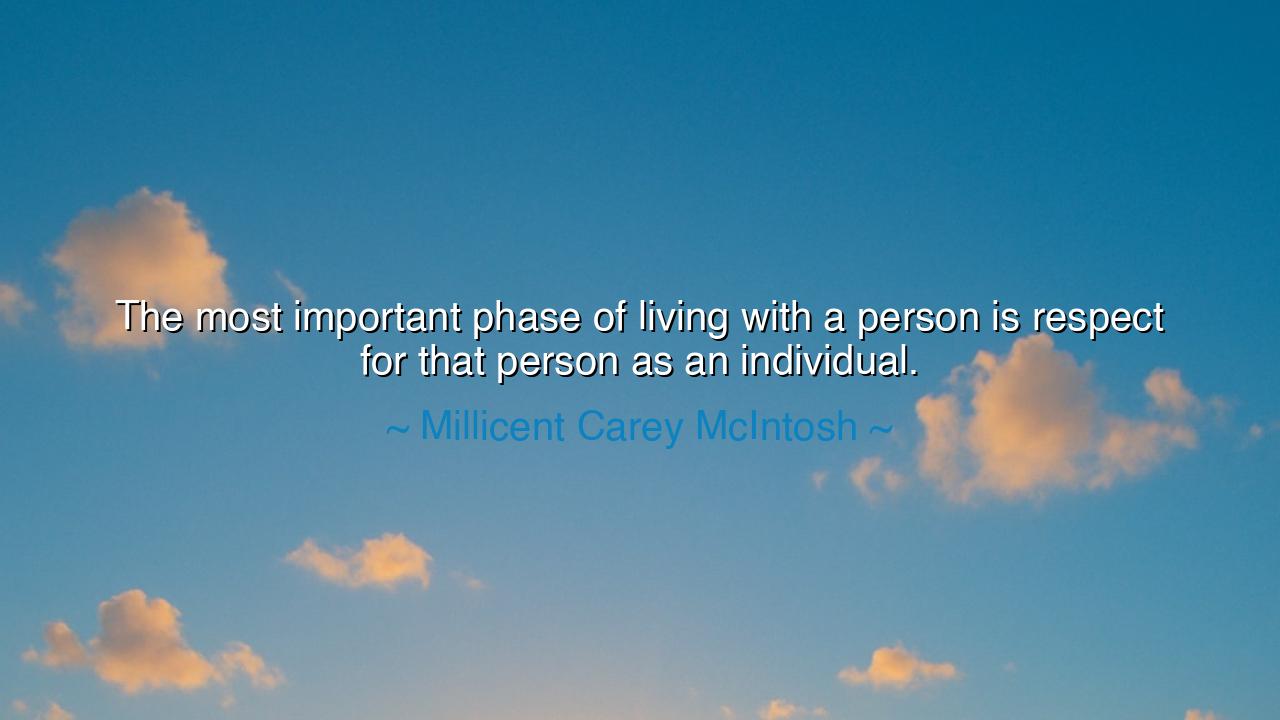
The most important phase of living with a person is respect for
The most important phase of living with a person is respect for that person as an individual.






“The most important phase of living with a person is respect for that person as an individual.” Thus spoke Millicent Carey McIntosh, a woman of wisdom and dignity, whose life was devoted to the nurturing of minds and the shaping of hearts. Her words flow like a calm river of truth — gentle in tone, yet deep in meaning. For in them lies the foundation of all human harmony: the sacred art of respect. Without it, love becomes possession, friendship turns to dominance, and community dissolves into discord. But where respect for the individual lives, peace and understanding flourish like gardens in sunlight.
To live with another — whether as friend, partner, or kin — is not merely to share space or time, but to share the sacred mystery of being human. Each soul carries its own song, its own rhythm, its own unseen world of dreams and fears. To respect another is to listen for that music, even when it differs from your own. It is to say, “Your path is not mine, yet I honor it.” Millicent McIntosh, who led women into education and leadership in an age that often silenced them, knew this truth from her own struggle. She understood that every person — man or woman, young or old — must be granted the freedom to be fully themselves. For to love or live with another without respect is to cage the spirit, and a caged spirit cannot sing.
The ancients knew this lesson well. When Socrates taught his pupils in the agora, he did not impose his thoughts as law. He questioned, he listened, he sought truth with them, not above them. His wisdom lay not only in his ideas, but in his respect for each soul’s power to reason and seek truth. So too did Marcus Aurelius, emperor and philosopher, write in his Meditations that one must “treat the opinions of others with patience, for each acts according to his understanding.” Even in power, he bowed to the dignity of human individuality — for true strength never crushes another’s will; it guides, it honors, it uplifts.
Yet this lesson is often forgotten in the intimacy of life. Families demand conformity, lovers seek control, friends judge when they should understand. Respect, that quiet virtue, is cast aside in the heat of emotion. But McIntosh reminds us that the highest form of love is not possession, but reverence. To respect someone is to see the divine spark within them — to honor their thoughts even when they oppose your own, to value their choices even when they walk a path apart from yours. This is not weakness; it is wisdom. For where respect is present, trust is born. And where trust grows, love becomes eternal.
Consider the story of Eleanor and Franklin Roosevelt, two souls bound by both affection and complexity. Their marriage, marked by both unity and independence, was sustained not by constant agreement but by mutual respect. Eleanor, though often in the shadow of her husband’s presidency, carved her own destiny as a voice for justice and humanity. Franklin, though driven by ambition and burdened by illness, trusted her strength and intellect. Their partnership endured because each respected the other not as an extension of themselves, but as a sovereign being. In that balance of individuality and companionship lay their greatness — and the enduring truth that love without respect withers, while respect gives love its roots.
Millicent Carey McIntosh, as president of Barnard College, lived her teaching. She believed in the sacred individuality of every student, every thinker, every woman who sought her own voice in a world that too often told her to be silent. Her words were not born from philosophy alone but from the daily act of seeing and honoring others. Her respect for the individual became her gift to generations — a light passed from teacher to student, from mother to child, from friend to friend.
Let her wisdom, then, be engraved in your heart: to live with someone is to behold them as a universe, not an object. Listen before you speak. Seek to understand before you judge. Honor their boundaries, their dreams, their sacred difference from you. In every relationship — love, friendship, or family — practice respect not as courtesy, but as devotion. For it is the soil in which all other virtues grow.
And so, remember this truth, children of the future: Respect is the soul of coexistence. To respect another is to recognize the divine in them; to disrespect them is to blind yourself to that same divinity within you. Be patient. Be humble. See others not as mirrors, but as stars — each shining with their own light. Then, and only then, will you know what it means to truly live with another — not in dominance or dependence, but in sacred harmony.






AAdministratorAdministrator
Welcome, honored guests. Please leave a comment, we will respond soon